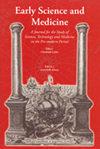Inquisitor as Physician: Friars, Inquisitors, Women, and Medical Knowledge in Early Colonial New Spain (1530–1650)
IF 0.5
2区 哲学
Q3 HISTORY & PHILOSOPHY OF SCIENCE
引用次数: 0
Abstract
New Spain was the site not only of one of the largest-scale missionary enterprises in Christian history, but also of a prolonged encounter among diverse medical traditions of Mesoamerican, African, and European origin in which male missionaries were central. Given the paucity of licensed physicians in the colony, religious involvement in medical practice remained significant throughout the colonial period. This paper considers the confluence of religion and medicine in the encounters that friars and inquisitors had with women, arguing that in these encounters, missionaries and inquisitors participated in the translation, circulation, and creation of medical knowledge and positioned themselves as both theological and medical authorities, as proponents and translators of Galenic medical theory, and as “confessor-physicians” rather than “confessor-judges.” Women thus played a crucial interlocutory role in the articulation of a colonial religio-medical regime whose primary framers were not physicians, but clergymen.作为医生的审判官:新西班牙早期殖民时期的修士、审判官、妇女和医学知识(1530-1650)
新西班牙不仅是基督教历史上规模最大的传教企业之一,也是以男性传教士为中心的中美洲、非洲和欧洲起源的各种医学传统长期相遇的地方。由于殖民地缺乏有执照的医生,在整个殖民时期,宗教对医疗实践的参与仍然很重要。本文认为,在修士和审判者与女性的相遇中,宗教和医学的融合,认为在这些相遇中,传教士和审判者参与了医学知识的翻译、传播和创造,并将自己定位为神学和医学权威,是盖伦医学理论的支持者和翻译者,是“忏悔者医生”而不是“忏悔者法官”。因此,妇女在殖民地的宗教-医疗制度中发挥了至关重要的中介作用,该制度的主要制定者不是医生,而是神职人员。
本文章由计算机程序翻译,如有差异,请以英文原文为准。
求助全文
约1分钟内获得全文
求助全文
来源期刊

Early Science and Medicine
HISTORY & PHILOSOPHY OF SCIENCE-
CiteScore
0.50
自引率
0.00%
发文量
22
审稿时长
>12 weeks
期刊介绍:
Early Science and Medicine (ESM) is a peer-reviewed international journal dedicated to the history of science, medicine and technology from the earliest times through to the end of the eighteenth century. The need to treat in a single journal all aspects of scientific activity and thought to the eighteenth century is due to two factors: to the continued importance of ancient sources throughout the Middle Ages and the early modern period, and to the comparably low degree of specialization and the high degree of disciplinary interdependence characterizing the period before the professionalization of science.
 求助内容:
求助内容: 应助结果提醒方式:
应助结果提醒方式:


